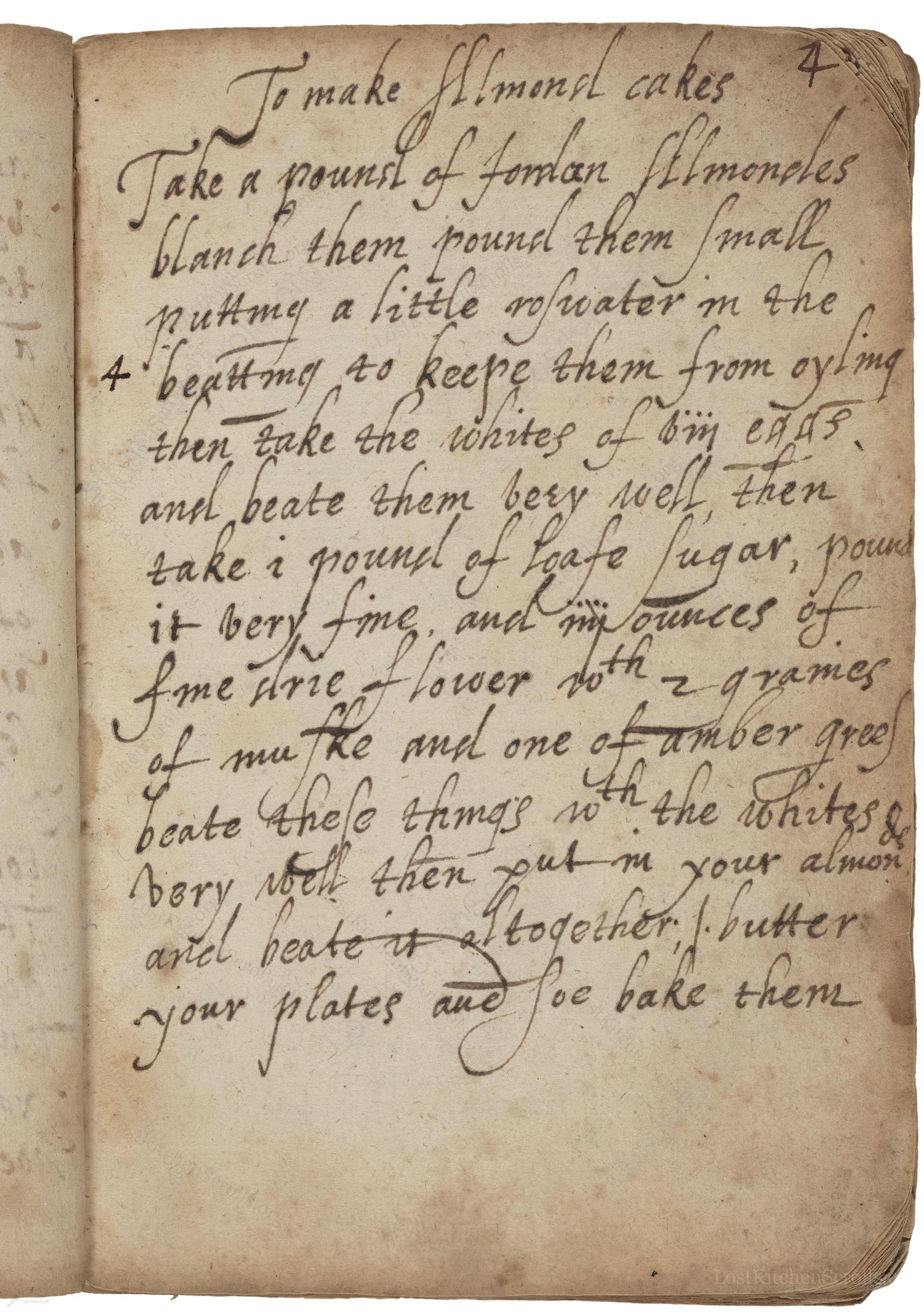To Make Allmond Cakes
From the treasured pages of Medicinal and cookery recipes of Mary Baumfylde
Written by Mary Baumfylde

To Make Allmond Cakes
"Take a pound of Iordan Allmondes blanch them pound them small putting a little rofwater in the 4 beating to keepe them from oyling then take the whites of 8 or eggs and beate them bery well, then take 1 pound of loafe Sugar, pound it bery fine, and two ounces of fme drie flower doth 2 grames of muske and one of amber grees beate these things with the whites & bery well then put in your almon and beate it altogether, butterr your plates and foe bake them"
Note on the Original Text
The recipe employs early modern English spelling and punctuation—'allmondes' for almonds, 'beate them bery well' for 'beat them very well', and so on—reflecting non-standardized spelling of the time. Ingredients are often listed within the instructions, with imprecise measures (such as a 'little rosewater'), typical of manuscript recipes meant for experienced cooks. Exotic flavorings like musk and ambergris were used as luxury aromatics, though these are rare or prohibited today. The recipe expects the cook to know basic processes like blanching almonds or how to judge doneness, and presumes all ingredients are prepared by hand from raw.

Title
Medicinal and cookery recipes of Mary Baumfylde (1626)
You can also click the book image above to peruse the original tome
Writer
Mary Baumfylde
Era
1626
Publisher
Unknown
Background
A sumptuous journey into early 17th-century English cookery, this delightful volume offers a tantalizing glimpse into the recipes, flavors, and culinary secrets that once graced aristocratic tables. Prepare for a taste of history, presented with wit and wisdom!
Kindly made available by
Folger Shakespeare Library
This recipe comes from the early Stuart period in England (circa 1626), attributed to Mary Baumfylde, a female manuscript recipe compiler. Almond cakes, sometimes known as 'macaroons', were popular among the gentry, valued for their luxurious ingredients like Jordan almonds, imported sugar, and exotic scentings such as rosewater, musk, and ambergris. Cakes at this time were often more akin to meringue-like biscuits or small confections, rather than the leavened sponge cakes we know today. These confections would have been served at banquets or as part of large feasts, a testament to a household's wealth and access to fashionable import goods.

In the 17th century kitchen, pounding almonds was done using a large mortar and pestle, usually made of stone or brass. Eggs were broken and beaten with a bundle of sticks or a fork. Sugar, sold in loaves, was grated or pounded to fineness. Ingredients were mixed by hand, and simple earthenware or pewter dishes were used for baking. The cakes themselves were baked in a wood-fired oven, on greased metal or shallow earthenware plates.
Prep Time
30 mins
Cook Time
20 mins
Servings
24
We've done our best to adapt this historical recipe for modern kitchens, but some details may still need refinement. We warmly welcome feedback from fellow cooks and culinary historians — your insights support the entire community!
Ingredients
- 1 lb Jordan almonds (raw, blanched)
- a few teaspoons rosewater
- 8 egg whites (from large eggs)
- 1 lb caster sugar
- 2 oz plain wheat flour
- pinch of ground musk (optional, substitute with a dash of rosewater or vanilla)
- pinch of ambergris (historically used, substitute with vanilla extract or omit)
- butter (for greasing baking tray or parchment paper)
Instructions
- Begin by blanching 1 pound of raw Jordan almonds, then grind them finely in a food processor or with a mortar and pestle.
- Add a splash of rosewater to prevent the almonds from releasing too much oil as you grind.
- Beat the whites of 8 large eggs until frothy and light.
- In a seperate bowl, grind 1 pound of fine caster sugar.
- Sift in 2 ounces of plain wheat flour and, if available, add a pinch of ground musk and a tiny amount of ambergris (or substitute with a hint of vanilla for aroma).
- Mix the whites with the sugar and flour mixture, then incorperate the ground almonds.
- Mix everything thoroughly to form a thick batter.
- Line baking trays with buttered parchment.
- Spoon small rounds onto the tray and bake at 340°F (170°C) for about 15–20 minutes, or until lightly golden at the edges.
Estimated Calories
170 per serving
Cooking Estimates
Preparing the almonds and batter takes about 30 minutes. Baking the cookies takes another 15–20 minutes. Each serving has about 170 calories, and the recipe makes about 24 cookies.
As noted above, we have made our best effort to translate and adapt this historical recipe for modern kitchens, taking into account ingredients nowadays, cooking techniques, measurements, and so on. However, historical recipes often contain assumptions that require interpretation.
We'd love for anyone to help improve these adaptations. Community contributions are highly welcome. If you have suggestions, corrections, or cooking tips based on your experience with this recipe, please share them below.
Join the Discussion
Rate This Recipe

Den Bockfisch In Einer Fleisch Suppen Zu Kochen
This recipe hails from a German manuscript cookbook compiled in 1696, a time whe...

Die Grieß Nudlen Zumachen
This recipe comes from a rather mysterious manuscript cookbook, penned anonymous...

Ein Boudain
This recipe comes from an anonymous German-language manuscript cookbook from 169...

Ein Gesaltzen Citroni
This recipe, dating from 1696, comes from an extensive anonymous German cookbook...
Browse our complete collection of time-honored recipes



